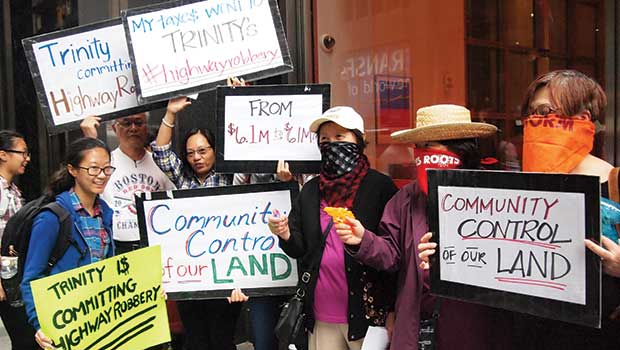
Tenants of a Chinatown affordable housing complex say the property’s current owner agreed to sell the building to them, but that the steep sticker price demanded is unconscionable. In protest, Mass Pike Tower tenants marched outside the developer’s downtown Boston offices last Friday, chanting “No to highway robbery,” and wearing bandanas Wild-West style over their face to underscore their message.
Trinity Financial, a for-profit firm with a long history of affordable development, purchased the 200-unit Mass Pike Towers in 2000 as part of a bid to maintain the housing complex’s affordable status. To make the buy, Trinity used public funding and agreed to let tenants and city government have a chance to purchase the property 15 years later. When that time came around, the developers and tenants clashed over definitions of a fair price — a disagreement of $20 million.
Tenants protesting last Friday said that regardless of which price is approved, Trinity will reap a sizeable profit. Indeed, the dispute is over whether Trinity will receive seven times the original $6.1 million purchase price, or can keep the property unless paid ten times the purchase price.
Bill Oranczak, president of the Mass Pike Towers Association, said that while tenants are not at near-term risk of removal, transferring the site to community control would ensure that as development pressures continue to rise, a piece of the neighborhood remains with current residents. For Trinity to press the issue is unethical, he said.
“Affordable housing is not a cash windfall,” Oranczak told the Banner at the protest. “Affordable housing is about helping people. … There is a sense of urgency because of the massive development going on in the area, development that is squeezing land and affordable housing.”
Trinity Financial did not return requests for comment by Banner press time.
A rescue … then a fight
In 2000, the low-income rental subsidies on Mass Pike Tower’s units were due to expire. To save the units from the risk of being converted to market rate, a deal was arranged under which Trinity would buy the property, fix up the aging units and ensure they stayed affordable until 2070.
Another part of the deal allowed tenants a six-month window 15 years later in which they could purchase the site, followed by a six-month window in which the city could do the same. Tenants missed their time slot and urged the city to buy the property and ultimately transfer it to the Chinatown Community Land Trust. While the city was willing to do so, negotiations snagged over terms of purchase.
A third party representing the Mass Pike Towers tenant association assessed the complex to be worth $42 million, and with Preservation of Affordable Housing (POAH) funding, tenants have raised this amount. But a city-appointed appraiser pegged the fair market value at $61 million, a number Trinity stands by. Oranczak said the additional $20 million is outside of tenant association and POAH means.
Public funds
At face value, the fight is over differing assessment methods, but running beneath it is an undercurrent of debate over proper use of public funds, and what can be demanded from a developer.
Lydia Lowe, director of the land trust that seeks to acquire the property, is quick to note that Trinity did not put any of its own money into the project.
“They never put a penny into this land. It’s all tax dollars,” Lowe said.
In 2000, Trinity received about $16 million between state, local and federal funds, tax credits and loans for purchasing and renovating the building. Tenants say Trinity was able to get such a deal because of the compelling agreement it made with tenants — including the purchase option.
Protestors said their faith in Trinity was shaken also in 2004 when the developer proposed building a market-rate apartment tower on the parking lot. Tenants objected that it would block their light, remove needed parking space and drive up rents in an area saturated with luxury units. In the face of such opposition, Trinity abandoned the plan.
Lowe acknowledged that Trinity has a generally good track record, but said the Pike Towers dispute has made her doubtful of the firm’s intentions.
Differing value assessments
Where do the different property value assessments come from?
Trinity officials maintained in a statement to The Boston Globe that the firm only is asking its due by insisting on receiving $61 million.
Lowe, however, says the higher number is erroneously inflated. According to her, the city appraiser’s number calculates property value on the assumption that one would be reaping market-rate rent on the units— not keeping them affordable. Tenants also say the city assessment improperly took into account features such as more recent subsidies, which raised the value of the property but had not existed at the time of signing the agreement in 2000. According to Lowe, tenants and developers agreed that the offer price on the property would be based on its market value, while also taking into account the affordability restrictions that were present at the time of signing.
In 2016, tenants and POAH turned to court action, represented by attorneys from Greater Boston Legal Services. (The city is not involved in the case). The tenants filed a suit in the Suffolk Superior Court that seeks to compel Trinity to accept the $42 million offer. Since then, Trinity has made several bids to get the case dismissed, Oranczak said.
Should they lose the case, tenants have decades of breathing room before Trinity’s affordability designations expire. Yet Lowe said given the high price being asked now, there’s no guarantee it will not rise even higher should Trinity sell in the future.






